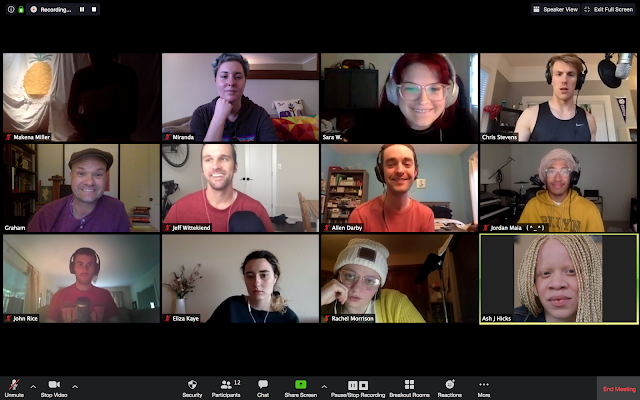MFA Students on Learning from Home and Maintaining Their Mental Health
By Claire L. Wong
For nearly two months, A.C.T. MFA students have been learning from home, an adjustment that takes mental energy and creativity. The faculty and staff members have been adapting to digital teaching and rehearsing, while maintaining as much normalcy as possible. “It’s meaningful to have structure and to create during this uncertainty,” says A.C.T. Conservatory Director Melissa Smith. “The need to connect is fundamental to being human and through connection we evolve and become more empathetic.”
The cast and creative team of A.C.T.'s MFA production of Rough Magic, directed by M. Graham Smith, rehearse over Zoom.
Many MFA students have returned home or are living with family while sheltering in place, which poses challenges—and opportunities—to rehearsing. “I moved home to Utah for the quarantine,” says Grace Fojtik. “I’m returning to the place of play where I’d spend hours in my backyard pretending to be a spy or an explorer. Tapping into that kid-like imagination has made the process much more fun.” Ash J. Hicks feels the same. “It’s opened up my imagination to the work outside of the rehearsal room,” she says. “I’ve spent time on my own creating a map of my character, so I have more time to make decisions and then try different things in real-time rehearsal.”
Technical difficulties and barriers can’t stop the MFAs from connecting with their peers and scene partners. “We’ve known each other for an entire school year now, so I can imagine my classmates more fully than if we’d just met,” says Cassandra Hunter. “As our movement teacher Danyon Davis says, it’s about maintaining these invisible threads that connect us. The character work doesn’t change that much. If anything, the inner life has to be all the richer since we’re working double time to imagine someone else there and respond.”
“What I’ve done to connect with my peers, director, and teachers is not let my laptop be a barrier,” says Hernán Angulo. “Not only do I have to tear down the wall that I’ve built to protect myself from being vulnerable, but I also have to tear down the wall that a laptop creates. But once I feel connected to my character and scene partner, the effort of tearing those walls down was well worth it! It’s a muscle I’m strengthening right now.”
A.C.T. MFA students Cassandra Hunter and Evangeline Edwards rehearse In Love and Warcraft, directed by Peter J. Kuo.
As the MFA students’ daily routines have changed, they’ve found ways to maintain their wellbeing. John Chukwudelunzu pairs reflection and meditation with working out. “Coming back to myself during the day helps to give me some perspective and take in the events that have happened,” says Chukwudelunzu.
“I’ve been going on walks and runs, practicing yoga, and I even started whittling and baking!” says Chris Stevens. “Trying new things has been a way to stay mentally healthy.” Angulo has been drawing daily. “Fifteen minutes of drawing is enough to de-stress, and it’s a good impulse exercise as well,” he says. Hunter has found caring for a bonsai tree grounding, and getting outside an important routine. “Sometimes I’ll do our Latin dance classes on the roof to get some sun,” she says.
“I’m really proud of my classmates,” says Hunter. “At first I had doubts on how I could ever manage to grow over this medium, but day after day I see them making leaps, bounds, and discoveries in their work. It’s a testament to their tenacity.” Hicks agrees. “I’m in awe of the A.C.T community’s resilience,” she says. “We took a mountain of lemons and made lemonade. This situation’s not ideal for any of us, but what’s been accomplished is pretty damn beautiful.”
To learn more about A.C.T.'s MFA Program, click here.



